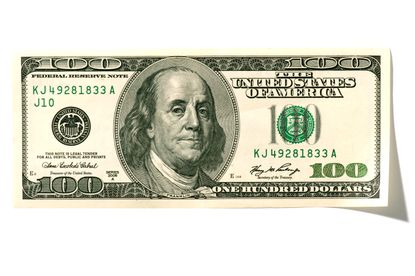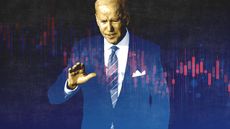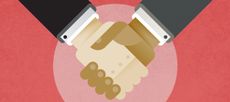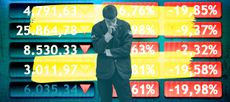America's job-market puzzle
The unemployment rate has plummeted. Why aren't wages spiking?

The smartest insight and analysis, from all perspectives, rounded up from around the web:
"The job market hasn't been this good for a very long time," said Nathaniel Meyersohn at CNN Money. The unemployment rate dropped from 4.1 percent to 3.9 percent in April, the lowest level since December 2000, the Labor Department reported last week. Employers added 164,000 jobs in April, "slightly below what economists were expecting but better than a comparatively sluggish March." Most of the hiring happened in professional and business services, which grew by 54,000 jobs; manufacturing added 24,000. A triumphant Trump tweeted, "3.9% Unemployment. 4% is Broken!" Yet the report also contained a "now-familiar disappointment," said David Dayen at the New Republic: stagnant wages. Average hourly earnings ticked up just 4 cents in April, for a total of about 67 cents, or 2.6 percent, over the past year. It makes sense that bosses don't like increasing pay, but periods of low unemployment, when businesses have to compete for workers, "are supposed to force their hand." The last time the labor market was this tight, wages rose at an annual rate of more than 4 percent. Our current state of affairs is "not how the economy is supposed to work."
The fact that workers haven't gotten bigger raises "this far into one of the longest expansions on record remains a puzzle," said Catherine Rampell at The Washington Post. One possible explanation is that there is more slack in the economy than the unemployment rate suggests. There are "still a lot of working-age people sitting on the sidelines" who aren't counted in the official statistics. Wages won't rocket up until the ranks of those would-be workers are exhausted. Higher-earning baby boomers are also "retiring en masse" and being replaced by mostly younger, cheaper counterparts, which could be skewing the wage figures. I think the recession is "still casting a shadow," said Paul Krugman at The New York Times. Employers are loath to cut wages even when times are desperate, because it's considered "demoralizing and unfair." But they're also reluctant to increase paychecks in good times, because they're afraid of being "stuck with those higher wages if the economy turns bad again." That would explain why companies are increasingly offering one-time bonuses over raises, because it offers them more flexibility than permanent salary hikes.
Subscribe to The Week
Escape your echo chamber. Get the facts behind the news, plus analysis from multiple perspectives.

Sign up for The Week's Free Newsletters
From our morning news briefing to a weekly Good News Newsletter, get the best of The Week delivered directly to your inbox.
From our morning news briefing to a weekly Good News Newsletter, get the best of The Week delivered directly to your inbox.
Wages aside, the U.S. economy appears to be "enjoying a Goldilocks moment, running neither too hot nor too cold," said Harriet Torry at The Wall Street Journal. But if unemployment runs "too low for too long, inflation or dangerous financial bubbles could build." The last three times the jobless rate fell below 4 percent for more than a few months — in the 1950s, 1960s, and 2000 — the U.S. got one of those outcomes, followed by a recession. Federal Reserve officials are now watching for the labor market's sweet spot, the moment when unemployment falls to its lowest level before inflation starts increasing, at which point they'll start boosting interest rates more aggressively. If the Fed lets the unemployment rate fall too far without taking action, it could be hard to manage what happens next. When joblessness "gets very low and then starts rising, it tends to rise a lot."
Create an account with the same email registered to your subscription to unlock access.
Sign up for Today's Best Articles in your inbox
A free daily email with the biggest news stories of the day – and the best features from TheWeek.com
-
 The pros and cons of noncompete agreements
The pros and cons of noncompete agreementsThe Explainer The FTC wants to ban companies from binding their employees with noncompete agreements. Who would this benefit, and who would it hurt?
By Peter Weber Published
-
 What experts are saying about the economy's surprise contraction
What experts are saying about the economy's surprise contractionThe Explainer The sharpest opinions on the debate from around the web
By Brendan Morrow Published
-
 The death of cities was greatly exaggerated
The death of cities was greatly exaggeratedThe Explainer Why the pandemic predictions about urban flight were wrong
By David Faris Published
-
 The housing crisis is here
The housing crisis is hereThe Explainer As the pandemic takes its toll, renters face eviction even as buyers are bidding higher
By The Week Staff Published
-
 How to be an ally to marginalized coworkers
How to be an ally to marginalized coworkersThe Explainer Show up for your colleagues by showing that you see them and their struggles
By Tonya Russell Published
-
 What the stock market knows
What the stock market knowsThe Explainer Publicly traded companies are going to wallop small businesses
By Noah Millman Published
-
 Can the government save small businesses?
Can the government save small businesses?The Explainer Many are fighting for a fair share of the coronavirus rescue package
By The Week Staff Published
-
 How the oil crash could turn into a much bigger economic shock
How the oil crash could turn into a much bigger economic shockThe Explainer This could be a huge problem for the entire economy
By Jeff Spross Published


